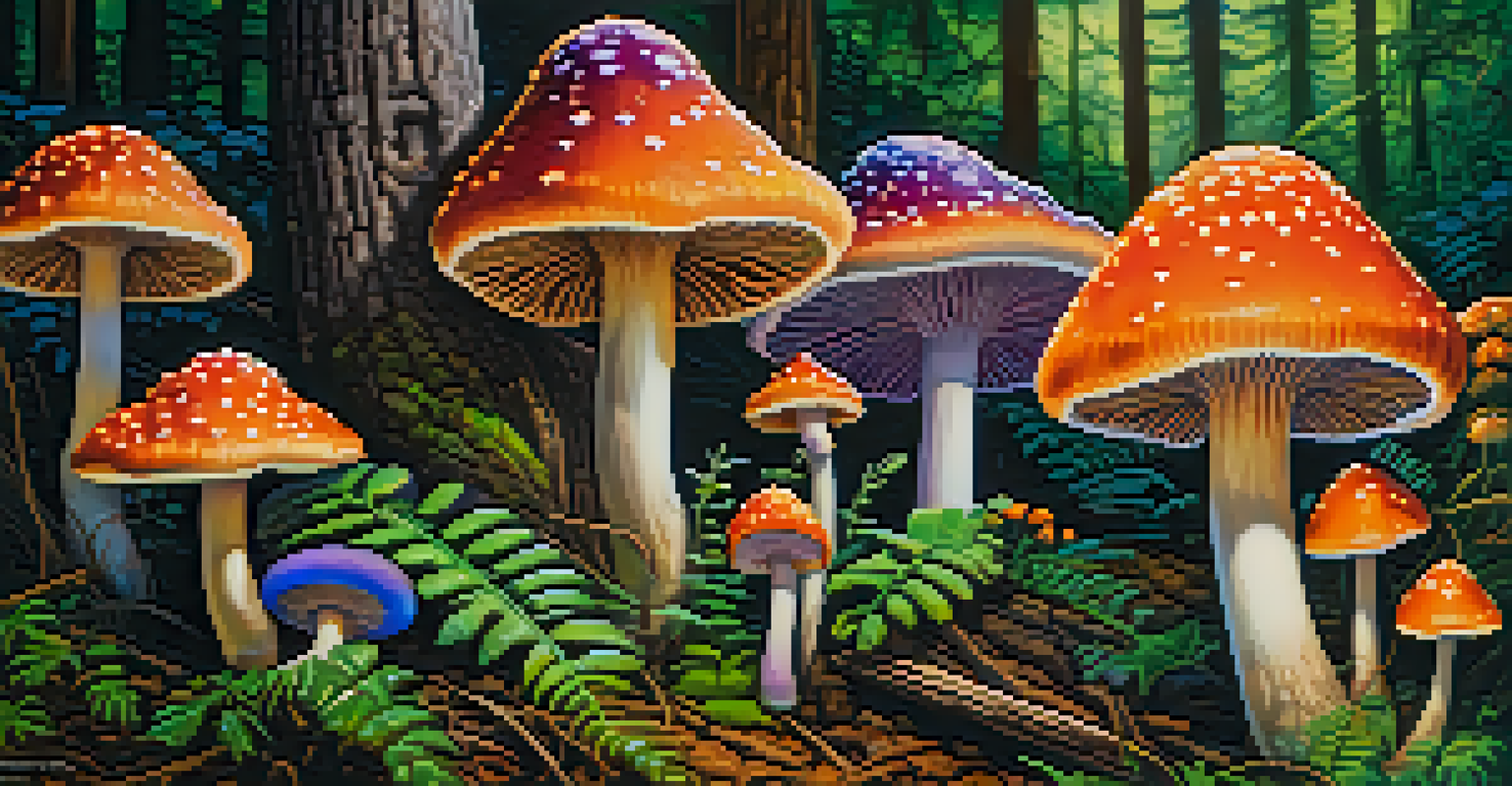Entheogen Research: A Scientific or Spiritual Endeavor?

What Are Entheogens? Understanding the Basics
Entheogens are substances that people use to induce altered states of consciousness for spiritual or religious purposes. Often derived from plants or fungi, these substances have been used for centuries across various cultures. They are typically ingested to facilitate deep introspection, connection to nature, or even communication with the divine.
The use of entheogens is a doorway to the divine within us, a means to explore the vast landscape of consciousness.
The term 'entheogen' comes from Greek words meaning 'generating the divine within.' This highlights the profound spiritual experience many users seek. For instance, indigenous tribes in the Amazon have used ayahuasca, a powerful entheogen, for healing and spiritual rituals, showcasing its cultural significance.
While these substances have traditionally been viewed through a spiritual lens, recent scientific studies are beginning to peel back layers of their physiological and psychological effects. This dual perspective sets the stage for an intriguing exploration of entheogens as both scientific subjects and spiritual tools.
The Historical Context of Entheogens in Culture
Throughout history, various cultures have incorporated entheogens into their spiritual practices. For example, the ancient Greeks used kykeon, a psychoactive drink in the Eleusinian Mysteries, to facilitate mystical experiences. Similarly, Native American tribes have long utilized peyote in religious ceremonies, seeking visions and guidance.

This historical perspective underscores the deep-rooted human desire to explore consciousness and seek answers to existential questions. It’s fascinating to see how these practices have been passed down through generations, often entwined with the cultural identity of the communities that embrace them.
Entheogens and Spiritual Practices
Entheogens, substances used for spiritual purposes, have a rich history across cultures, facilitating deep introspection and connection to the divine.
As modern society becomes more interested in mental health and well-being, there is a resurgence in these ancient practices. The blending of historical use with contemporary scientific inquiry creates a rich tapestry of knowledge and experience surrounding entheogens.
Scientific Research: What Do We Know So Far?
In recent years, scientific research on entheogens has gained momentum, with studies exploring their potential therapeutic benefits. For example, psilocybin, the active compound in magic mushrooms, has shown promise in treating depression and anxiety. Clinical trials suggest that patients often experience profound psychological shifts during and after treatment.
Psychedelics are a tool for spiritual growth, revealing layers of our being and connecting us to the universe.
Research is not limited to psilocybin; substances like LSD and MDMA have also been studied for their efficacy in psychotherapy. These findings are encouraging, as they provide a scientific basis for what many have long claimed: that entheogens can foster healing and personal growth.
However, it’s essential to approach this research with caution. The effects of entheogens can vary widely based on individual circumstances, dosage, and setting. This complexity invites a balanced conversation between science and spirituality, encouraging a deeper understanding of these powerful substances.
The Spiritual Perspective: Experiences and Insights
Many individuals who partake in entheogenic experiences report profound spiritual insights and personal revelations. Users often describe feelings of interconnectedness with the universe, a sense of unity with nature, and even encounters with divine entities. These experiences can lead to lasting changes in perspective and behavior.
For instance, people have shared stories of overcoming deep-seated fears or finding new meaning in life after an entheogenic journey. Such experiences can be transformative, providing a sense of purpose and connection that many seek in today’s fast-paced world.
Therapeutic Potential of Entheogens
Recent scientific studies indicate that entheogens like psilocybin and LSD may offer therapeutic benefits for mental health conditions such as depression and anxiety.
This spiritual aspect invites a rich dialogue about the purpose of these substances. Are they merely tools for therapy, or do they serve a greater purpose in understanding the human experience? The quest for answers continues, blurring the lines between scientific inquiry and spiritual exploration.
The Ethical Considerations in Entheogen Research
As interest in entheogens grows, so do the ethical considerations surrounding their use and research. Questions arise regarding the potential for misuse, cultural appropriation, and the commercialization of sacred practices. It's important to approach these substances with respect and understanding of their origins and cultural significance.
Moreover, ensuring that research is conducted responsibly is crucial. Researchers must prioritize participant safety and informed consent, as entheogenic experiences can be intense and unpredictable. Ethical frameworks must be established to guide this emerging field.
Engaging with indigenous communities and acknowledging their knowledge is essential in ethical research practices. Collaborating with those who have historically used these substances can help maintain respect for their cultural heritage while advancing scientific understanding.
Future Directions: Merging Science and Spirituality
The future of entheogen research holds exciting possibilities for bridging scientific inquiry and spiritual exploration. As studies continue to unveil the therapeutic potential of these substances, there is a growing recognition of their role in enhancing human well-being.
This merging of science and spirituality could lead to new therapeutic modalities, combining traditional practices with modern psychology. For instance, integrating mindfulness and guided therapy with entheogenic experiences might usher in a holistic approach to mental health.
Ethics in Entheogen Research
As interest in entheogens grows, ethical considerations regarding their use, cultural significance, and responsible research practices become increasingly important.
Ultimately, this relationship may pave the way for a more profound understanding of consciousness itself. As we delve deeper into the science of entheogens, we may also uncover insights that resonate with our spiritual quests.
Conclusion: A Journey of Discovery and Integration
In conclusion, entheogen research stands at a fascinating crossroads, inviting us to explore both scientific and spiritual dimensions. By examining these substances through both lenses, we can appreciate their complexity and potential benefits.
As we navigate this journey, it’s crucial to maintain an open dialogue that honors both empirical evidence and personal experience. This integration can help us understand the broader implications of entheogens in our lives and societies.

Ultimately, the exploration of entheogens could lead to transformative insights that benefit mental health, spiritual growth, and even our understanding of human consciousness. The journey is just beginning, and it promises to be an enlightening one.